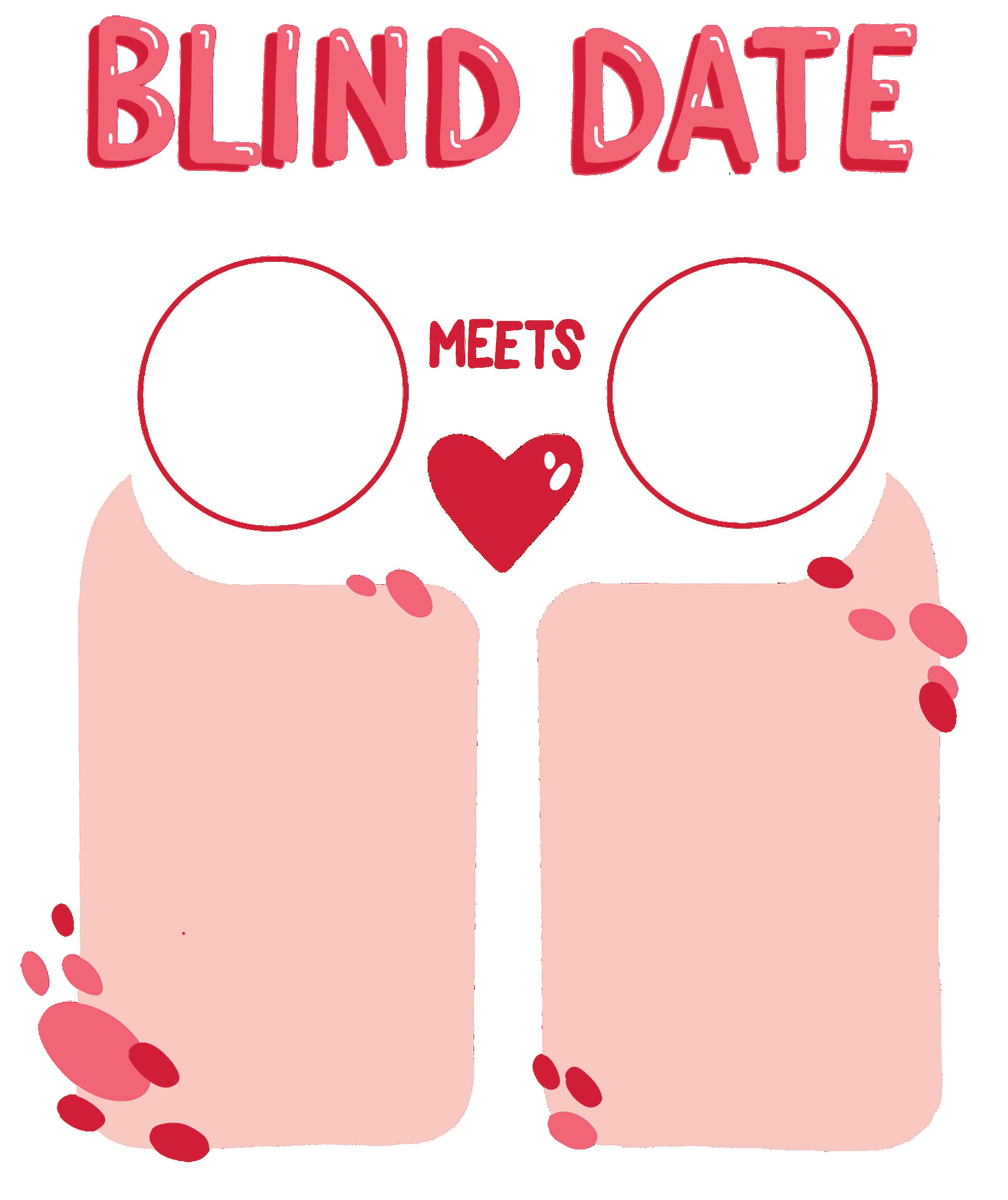
16 minute read
Blind date
from Courier 1410
Relationships
20 YEAL OLD LANGUAGE & LINGUISTICS STUDENT, GEORGIA
Advertisement

21-YEAR-OLD ACCOUNTING & FINANCE STUDENT, ALEX
Hi Georgia, why did you sign up for blind date?
My flatmate and I signed each other up for it as a fun and unusual thing to do.

What is your usual type?
Funny and active!
What were your first impressions of Alex?
He was chatty and friendly.
Did you enjoy going on a Zoom date?
Yes, because it was different and I got to wear my pyjama bottoms! But also no because the sound sometimes cut out which meant we had to keep repeating things.
What did you talk about on your date?
Uni and COVID, mainly. We had a laugh about a mutual friend.
Did you fancy him?
Yes
If Alex was a bar in Newcastle, which would he be and why?
No idea, perhaps 97 & Social because I had a laugh there but don't know him well enough to make judgement?
Have you been in contact with each other since the date?
Just an email to exchange numbers.
Hey Alex, why did you sign up for blind date?
I wasn't aware I'd been signed up until I was forwarded an image of my submission by my mates why thought they could have a laugh at my expense.
What's your usual type?
I usually tend to go for brunettes. I definitely prefer girls that can carry a conversation and take interest in getting to know me better. Always a plus if they tell a good story and have a relaxed sense of humour.
What were your first impressions of Georgia?
She made a great first impression with good conversation and managed to avoid any awkwardness that would come with meeting someone for the first time online.
Did you enjoy going on a Zoom date?
Honestly, I really wasn't looking forward to it being over zoom, but after getting to know Georgia it wasn't that bad, definitely would have preferred a nice bar though!
What did you talk about on your date?
We really just got to know each other and exchanged some good night out stories from our time at Newcastle. Also found out that I had seen her in one of her musical performances due to me having a mate in the same society.
Did you fancy her?
Yes, great girl to spend some time with, and I really like the Scottish accent!
Lifestyle "Hustle culture": a generation of workaholics




Anna Robson delves into "hustle culture" and whether the idea of working till you drop is toxic or motivational Technological giant Elon Musk reiterates this idea stating that “nobody ever changed the world on 40 hours a week”. Hustling maybe that bit of motivation that someone needs to kick-start their week, we shouldn’t attack someone for wanting to work for their goals. We shouldn't attack someone for wanting to work for their goals
Anna Robson Hustle culture can get toxic when you start to put your mental health below this idea of ‘conHustle: verb (North American English) Meaning – to act in an aggressive way or with a lot of energy. As a generation, we are driven by external goals. It is what gives us purpose in life. It is the goals we set, the bucket lists we create, and the thing that gets us up in the morning. Through social media, we are being surrounded by success stories of Instagram influencers showcasing their Louis Vuitton collection and stant working’. Hustle culture focuses on tangible outcomes, good mental health is not tangible but this does not however limit its value. Hustle culture can get toxic when you start to put your mental health below this idea of constant working when you could get it done in 2, just to say “this project took me 8 hours”? Hustle culture focuses more on quantity than quality. Working is not a competition with other people, it should only be about yourself and your goals. Longer working hours have been scientifically proven to result in poorer mental health and higher levels of anxiety and depression. Hustle culture is a new brand that people are buying into. Working hard is not a bad mindset to have, as long as you are not sacrificing your well-being! inspirational business people rising through the ranks to become millionaires. Our feed is bombarded with motivational quotes and self- So, what should we do to get made entrepreneurs proclaiming #RiseandGrind. out of this mindset? It is
Hustle Culture is a fast-paced environment that essential to maintain a feeds off long working hours and a restless sense work-life balance, as a of striving for some type of goal. Picture the hustle tired brain is an unproand bustle of New York City. You think of Wall ductive brain. Make
Street and Suits. But do you also imagine people sure you take time happy and content with where their lives are right off work to spend now? Probably not. time for
That is because Hustle Culture looks to the yourself and future, missing out on living in the present. You friends (while define yourself on external pressures instead sticking of finding inner happiness and finding ‘casual to govmagic’ in your everyday life. It is a new kind of ern philosophy. It has replaced the role of religion in ment giving people meaning and a purpose in life.
Hustle Culture is not all bad. It depends upon guidehow far you take it! It would be very naive of us lines of to dismiss the benefits that hustle culture has in rejection allows time to reflect on what you want in your career, allowing you to either redirect or improve to meet goals. our capitalist society. It is essential for modern- course!), day social mobility that we work hard in the take up a hobby, profession we do in order to climb the ladder of go on a walk, anysuccess. Everything in life revolves around money thing! Doing so will allow and getting a good job. If it means working, as Dolly would say, 9-till-5, then that what it takes! your mind to recharge. It is slog on a projection for 8 hours Image: Pixabay @PublicDomainPicture Image: Pixabay @Comfreak
Turning rejection into redirection
Caitlin Sinclair sheds light a tool for personal growth. What did you learn throughout the application process and how will Caitlin Sinclair on to why rejections doesn't point to an automatic failure It isn’t just about whether you are the right fit for them, it is also about whether they are the right fit for you. this help going forward? This allows you to grow with the process and adapt your approach in application or interviews. Use the process as an opportunity to explore company’s and firms and learn what you want from them. Although in application processes it feels like you Rejection is something that everyone will experience in their lifetime. As a law student seeking a training contract at a firm, rejection is something I have grown accustom to. Changing your view of rejection shouldn’t be about no longer feeling disappointed as this is often inevitable, but rather about how you can use it as a tool to progress going forward. Without rejection, you aren’t able to reflect on your motivations behind applications or your intentions with a specific course of action. Initially, I had applied for several commercial training contracts as this is what I felt was the desirable route after graduation, however, after subsequent rejections I realised that my motivations were entirely wrong. I wasn’t applying because this was something I longed to do as a career but rather because I felt it was something that I should be are under a lot of scrutiny, it is a two-way process. What is it about the company you were drawn to, was there anything that didn’t appeal to you? It isn’t just about whether you are the right fit for them, it is also about whether they are the right fit for you. Try and separate yourself from the rejection. It doesn’t mean that you are inadequate, it may just mean that your strengths didn’t align with the weaknesses of their current team to allow for a well-rounded workforce. The fault doesn’t lie with you personally. It may simply be that it wasn’t the right time. Or perhaps there is growing room for you to develop in the next round of applications. You are more than adequate for the right company or Without rejection you aren't able to reflect on your motivafirm. Ultimately, give yourself credit for putting yourself out there tion and know you are better equipped for the next round of Image: Pixabay doing. There is value in assessing the situation and @Pexels applications.
Image: Instagram @yaoyaomva Working with rejection, rather than against it is essential. This can be done by using rejection as
THE COURIER Monday 19 October 2020
Lifestyle 17 Why it's OK to say 'no' Creating a homeCora Herbert analyses the importance of the word 'no' be an anxious person and trying to reduce stressful situations. Or quite simply they just might not feel up to it. All these reasons are perfectly valid as is any other feeling of caution towards ‘breaking the rules’. We all have that worry of what others might away -from -home Normally, my advice to students, especially first-years, is to say yes to everything. I would usually say push yourself, venture out of your comfort zone, take every opportunity that you can. But this year that rule goes out the window and my new message is this: it’s okay to say no! No, you’re not being a buzz kill. You’re not being boring or unadventurous – you're being safe and taking care of yourself which is the most important thing at times like these. Day-to-day life is challenging enough at the moment so there is no need to overwhelm yourself with situations that will make you feel uncomfortable. The new guidelines about what is and isn’t allowed is as complicated as ever and it seems each person has their own stance on what they’re happy doing or who they’re happy seeing. So be confident in your own boundaries and if you’re asked to do something or go somewhere that’s going to make you anxious, you can say no. There are so many reasons why people may not want to be socialising in the same way as usual – they may have health issues or live with someone who does. They might Each person has their own stance on what they're happy doing or who they're happy seeing Image: Pixabay @thisismyurl Cora Herbert think of us. But please believe me when I say that no one will judge you. Honestly. If this year has taught us anything, it’s to be kind and understanding – your friends, new and old, will respect your decisions. Everyone deals with difficult situations differently so there is no need to compare yourself to others. Understand, as the people around you will, the importance of taking time for yourself. Having said all this, there is still an argument for maintaining a sense of ‘normality’ (whatever that might be) by trying your best to keep in touch with people and getting involved with all that university life has to offer. Socialising in one way or another is so important and can be helpful and supportive, but it should never come at the cost of your safety, health of sense of well-being. You know your own boundaries and we have these limits for a reason, so if you’re not comfortable with a situation - as with everything in life – it's always okay to say no. Moving away to uni can be extremely daunting, even if, like me, you've done it a couple of times already. Not only are you leaving your family behind, you're also leaving your room behind- that sanctuary where you feel warm, comfortable and safe. It's also likely that you'll be living in a different place each year, so getting comfortable in a new room is something you'll have to get used to. If you're going into first year especially, you're likely to feel like your halls room doesn't quite feel homely at first. Everyone's room looks the same and they're often quite small, so decorating has to be done efficiently. However, it's important that you don't neglect making your room your own, as coming home to a room you don't feel comfortable in can really kill your mood. In my opinion a uni room should be three things: practical, comfortable and personal. Addressing the first of those, for a room to be practical it has to be somewhere that you're comfortable working in. This is especially important this year, as you're likely to not be in uni very often and the Robbo reopening seems like a distant dream at this point. One of the most important things to making your room practical is keeping your desk tidy. That doesn't mean it has to be bare, but making sure you have enough room for your laptop and notebook is essential. It's also a good idea to have some organisational items such as baskets or stacking trays to keep your stationary in. Having a to do list on something like a hanging whiteboard can also help you to concentrate when essays start to pile Dominic Lee touches on how to create a homely environment in the university space Dominic Lee will make your room more practical is having hooks or trinket trays to help organise everyday items. Making your room comfortable is really simple. Something as simple as having some cushions on your bed for when you aren't sleeping and a blanket for cold nights can really make a difference to how you feel when you're in your room. Invest in some good pillows and a warm duvet because the nights can get cold up in the toon and you don't want to be up all night shivering. I struggle to get to sleep quite frequently so I also have some lavender pillow spray which is nice and soothing. Last but not least, making your room personal is arguably the most important of the three. I've surrounded myself with my hobbies, the main one of which is music. I have posters of gigs I've been to and bands that I love. My cushions are also musically themed and I have two Radiohead clocks just so everyone knows what a sad little man I am! My lager poster was given to me by one of my closest friends and my Spuddy and "love bug" were given to me by my mum. Photos of family and friends are also a must. Making your room personal can be a work in progress and although I'd say my room is fairly well decorated I'm definitely not finished with it. I'd like to add some plants to the mix- and hopefully keep them alive longer than a month this year- and I also plan on making some more home accessories. I've kept a bottle of Newcastle Brown Ale to turn into a candle and I'm also planning on making some letter bunting out of cardboard beer boxes. very student chic I know. Creating your own home-away-from-home can be a lengthy process. However, it doesn't have to be a stressful one. Making sure that you decorate your room at least partially within the first few days of your arrival can lead to a much happier settling in period. Then, once you've settled in the real fun starts and you can go wild with accessories. In no time at all you'll find that your uni room starts to feel just as cozy as your room at home!
Upon reflection: lessons of my first year

Molly Taylor gives her five most valuable lessons of her first year at University
Molly Taylor
Istarted reading English Literature at Newcastle University in September 2019, after spending some time outside of education on my gap year. Like most university freshers, I was excited but also really nervous about starting my course. Will I like the city? Will I make any friends? Will everyone on my course be much smarter than me? All the usual stuff. This, therefore, is a compiled list of five things that, after reflecting on my first year of university (and arguably my first year of being a proper adult), I would tell my past self and anyone else who feels nervous about being a fresher. 1.Everyone is as scared as you I know it’s hard to believe, but people are just as nervous as you, and are also just as desperate to make friends. So, go on, talk to that boy in the corner who’s drinking that disgusting red bull vodka concoction. What’s the worst that can happen? Chances are, if it goes badly, you'll never see him again. Alternatively, (and more likely), you’ll have a nice conversation and discover you’re both recycled origami fanatics, or massively into Psychedelic Christian emo heavy metal 2. Seasoning is...everything Cooking for yourself for the first time can feel daunting. I often found that recipes I had planned were too time consuming and laborious after attending a whole day of university (who knew you up. Something you also shouldn't overlook which wouldn’t fancy trying out a three hour recipe after attending seven hours of lectures?). With that in mind, I found that seasoning is a uni student’s best friend, making a relatively bland meal slightly more interesting. 3. Everyone's friendship story is different
People often say you are likely to never see the people you meet in freshers’ week again. This was actually the opposite for me (minus a few people). My closest friends were some of the first people I met during freshers. My point is that you shouldn’t write someone off if they are not completely your cup of tea (or choice of beverage all together). You never know who might be wiping sick off your cheek after your next night out, or, you know... who might be your next best friend 4. Whilst optional things are optional, it's good if you go to them

Image: Evie Lake
I found it really useful to meet with or email lecturers if I had concerns about a piece of coursework or an exam. Even if you think you have that essay under control, it's always useful to get feedback and advice from someone who is literally paid to help you.
5. Lastly, you're paying for the degree, not just the resources you are give
University tuition is undoubtedly expensive and will put you in debt for some time. I still struggle with the notion that I am paying over £9,000 (pearl clutch) for a service which definitely does not cost that much to provide. Getting angry about it won’t change anything though, and so you’re just going to have to accept that you’re paying for the degree itself, I’m saying this as though I don’t get angry. I’m still fuming, but what can you do?
I hope this was useful, and if not, it was at least a cathartic process for me, as I reflect on my first year of university. It sounds like a cliché, but it goes fast, so enjoy it while you can.



